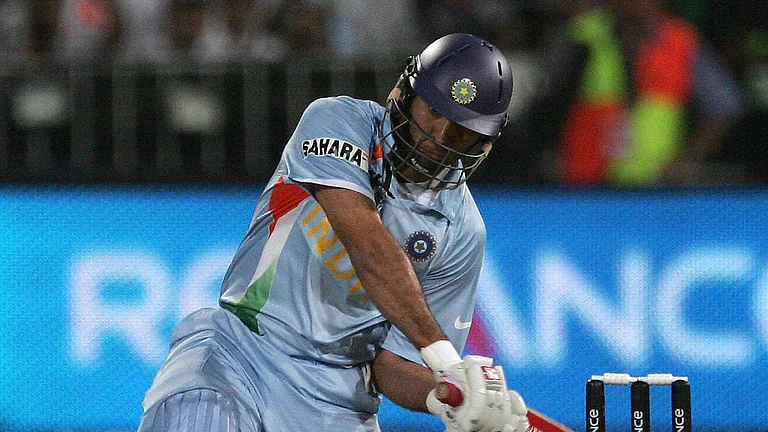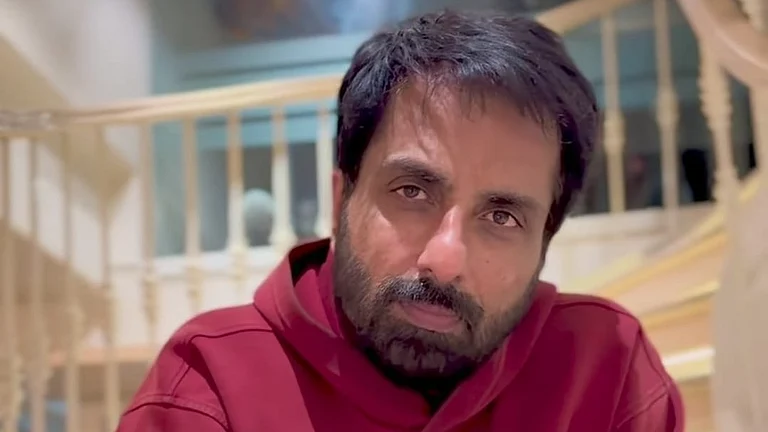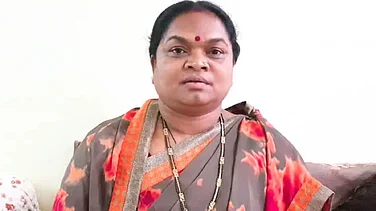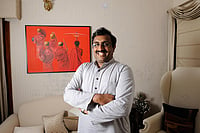On a Saturday night, a week before Diwali, a dozen gleaming luxury cars are parked outside J-255, a posh bungalow in New Delhi’s Sainik Farms. Inside J-255, the owners of these cars, the majority being the city’s real estate honchos, are anxiously waiting for the game to begin. The minimum a player needs to put down on the table is Rs 5 lakh. Gambling is a game of chance, but then what game isn’t!
By midnight, the gathering’s size has doubled—20 men, and the stakes are running into millions. They are serviced by a staff of 11, who take care of the food, drinks and the cars. At around 2:30 am, this engrossed contingent hears an unexpected knock on the door. Acting on a tip-off, the Delhi police has landed there with a team from two police stations. The game is over. A sorry entourage of alleged gamblers is taken to the station. This is a big gambling bust for the police. For those looking to take a chance with their money, J-255 will be a destination no more.
The Delhi police arrested 36 people that morning, including the dealer, four organisers, 20 players and the 11 staff members. The proprietor of the premises is absconding. The men in the gambling group were from various places—south Delhi, Haryana and Rajasthan. In addition to playing chips worth Rs 1.3 crore, the police teams confiscated 23 bottles of domestic and foreign liquor and 11 packs of playing cards, perhaps as souvenirs from the raid. “The location of the den was extremely convenient for this kind of activity,” says Nupur Prasad, Additional DCP South District. “It was easy to get to J-255 from nearby Rajasthan and Haryana and there were a lot of empty plots around.”
This gambling season, the Delhi police has been on a roll. Five days after the Sainik Farms raid, they raided a casino in Vasant Kunj. They arrested four people and confiscated three gambling tables. “The girl stands here, and she throws the chips like this,” says a police officer, describing the den’s activities to a group of men huddled around the confiscated tables at the station. “She stands here and she spins the roulette wheel like this,” he says, spinning the brass wheel at the centre of the table.
From cock fighting to the Mahabharata to modern day casinos, gambling has been part of the Indian subcontinent’s DNA. And for long, Diwali has been the big gambling season. During Diwali, it is not just the seasonal gamblers who put out their chips on the table but amateurs, thrill-seekers, ritual-keepers and reluctant participants egged on by their peers. The largely held belief is that if you are lucky during Diwali gambling, Lakshmi will bestow wealth in that coming year upon you. Yet it remains one of those ‘extra legal’ zones of the society, which is unacknowledged by written law, but exists all over.

J-255 Sainik Farms
Up till the1980s, gambling was still thought of by the general public in terms of dingy dens and public park congregations. But, it was the ‘match fixing’ in one day international cricket that gave the term a whole new definition. Now gambling was not just about a few voluntary individuals gathered around a table, it had infiltrated sports, entertainment and many other walks of life through the television screens all at the same time. If all those matches, watched with such fervour were ‘staged’, anything could be. For many spectators, betting changed the game forever. Since then, each action of the players on the field has come under their scrutiny to ensure that the match has not been fixed. After allegations of match fixing against South Africa’s captain Hansie Cronje, the CBI in 2000 investigated fixing and betting in sports. The investigating agency team empathised with the sports-lovers, hurt over match fixing, and said poetically: “The romanticism associated with the game is perhaps gone forever.” The CBI’s analysis of their findings is that betting in cricket is “perhaps the biggest organised racket in the country.”
At a time when support for prohibition seems to be growing (such as in Bihar), and the state grows more paternalistic, telling the citizens how to dress (as Union culture minister Mahesh Sharma has done), there aren’t many who seek legal avenues for gambling in view of economic gains? In 2014, senior advocate K.T.S. Tulsi raised the issue of legalising sports betting in Parliament, which is the case in many other countries including the UK. “I want to assure this House that legalised betting in sports is not going to make us a nation of gamblers,” he said. But it might have been his status as an independent member that allowed him to do this. Otherwise, the political class has either been silent or largely against legalising gambling, regardless of all the potential revenue it can help unlock.
There is considerable confusion on moral, legal and economic grounds when it comes to gambling. The general feeling, stemming from a moral argument, is that gambling is based on pure chance. With some credit to the 18th-century movement of Enlightenment, a global intellectual shift placed more emphasis on rationality and choice as opposed to chance. And although gambling has preceded and, indeed, succeeded the Age of Enlightenment, the opposition to gambling comes from those who view every form of it as akin to tossing a coin and betting on its outcome. The temperament since, has been about controlling uncertainty, and chance is at odds with this.
This black-and-white view of gambling doesn’t quite fit the legal framework. Indian jurisprudence has in fact differentiated between ‘games of skill’ and ‘games of chance’. An act cannot be considered gambling if there is a blend of skill and chance involved in the process or if skill outweighs chance. It is after all, one’s skill that enables one to calculate her chances and probabilities.
As far back as 1957, the Supreme Court said that competitions, which mostly involve skill, are business activities and not gambling. As of now, betting on horse racing is legal in India. In 1968, the Supreme Court also ruled that rummy is a game of skill. Games such as chess and golf also find a mention in the SC’s ruling, meaning that they too had to be evaluated and passed for having the ‘right’ amount of skill as weighed against chance in their gameplay. People such as Jay Sayta of GLaws.in argue that the same rationale can be extended and applied to poker, which has also become hugely popular in urban India but is legal only in Karnataka and Bengal. “Poker is a game of skill, but just because cards have come to be associated with gambling and money, people tend to automatically believe that if one is playing cards, then it must be illegal,” he says. “There is always an element of chance in any endeavour of life. Even litigation depends on luck,” opines Tulsi.
According to estimates of the Federation of Indian Chambers of Commerce and Industry (FICCI), India’s betting market is worth Rs 3,00,000 crore, of which only Rs 10,000 crore is legal. By FICCI’s estimate, the revenue the government could possibly earn by legalising betting stands between Rs 12,000 to Rs 19,000 crore. With regard to cricket, the Lodha Committee Report (2016) said that “legalising betting will curtail the influence of unethical elements on the sport, players and officials.” By its estimate, legal betting will bring Rs 10,000 to Rs 12,000 crore in revenue annually.
It is this revenue which former CBI director Ranjit Sinha is in favour of unlocking. “We are wasting time. Asking for clampdowns on gambling is unnecessarily burdening the system. Given that gambling is going to happen anyway, it’s better to earn the revenue and give quality to the game instead,” he says. Tulsi also believes it is irrational to prohibit betting on sports. “If you want revenues to multiply, you have to attract tourists and have to provide tourists with avenues of enjoyment. The forces holding us back are hypocritical.”

Delhi police display confiscated casino tables
Gambling can be a game-changer for tourism. Take the case of Macau in China. Macau is now the biggest gaming city in the world, surpassing even Las Vegas in the US. “I am in favour of a softer take on lesser vices. We must have pragmatism about our priorities. Law enforcement has many other serious crimes to focus on,” says P.C. Jha, former chief of the Central Board of Excise and Customs. Jha makes a two-fold argument. He says that legalising betting will bring in money and it will also save the money being spent on law enforcement.
The online gaming and betting space is even greyer than the more tangible forms of gambling. According to a KPMG report, the online gaming market is one of the biggest segments of the gambling industry. The gaming market itself was about $30 billion as of 2012. Even though some of the biggest markets, such as USA, China, South Korea and Japan, don’t allow many forms of gambling on the internet.
In India, as of late 2009, foreign agencies began submitting bids for internet gaming licenses. These included some of the biggest names in the business such as William Hill, Betfair and bwin. The online gaming market includes various games such as betting on sports, races, poker, bingo, lotteries and casino games.
The confusion comes from the fact that states in India are allowed to legislate on gambling on their own. The Public Gaming Act, 1867, is the only central legislation. But by the recent Information Technology Act, 2000, internet service providers and website hosts are required to block access to anything “relating to or encouraging money laundering or gambling” and this Act falls under the central government.
Despite clear financial advantages of bringing gambling in India above board, one of the biggest obstacles comes from law enforcement. The argument made by many with interest in the monetary windfalls is that once gambling is legalised, it will make monitoring and regulation much easier. This will include a clampdown on black money. Writing in FICCI’s report on sports betting in India, Mukul Mudgal, former chief justice of Punjab and Haryana High Court says: “The threats posed from this unregulated betting are immense; the society becomes vulnerable as revenue from these activities is used to finance criminal activities, the person placing the bet is at the mercy of the bookies as they have no legal right to have their bets realised.”
This view is countered by the experience of others in the police. “Law enforcement agencies don’t have a choice on laws, so we are enforcing whatever laws already exist at present. If legalising crimes is the solution to crimes, then legalise everything,” says Nupur Prasad. “But decriminalising everything will affect our social life. We have found that these habits are not conducive to public life. We have seen people who have given everything up because of their addictions.”
The possibility with legalisation, though, is that those who play in black money, will unlikely come on board. To that effect, illegal gambling may continue. What one might see is a new breed of gamblers, who play legally and who, so far, have stayed away due to the fear of stigma and criminality. To this, Sayta says, “Actually, most people, including players and organisers, would be more than happy to conduct these games without the hassle of a raid. So even those who play in black, will be likely to come above ground, if gambling is legalised.” To prevent the growth of gambling getting out of control, many countries enforce clear-cut gaming frameworks. “This means, people can set limits on how much money they want to gamble with, based on their salaries. Minors should be kept away from this. And people should always have the freedom to opt out,” he says.
Betting has taken a long time to be seen as an acceptable social activity in the West as well. It is only in the last decade that major European states have moved forward in legalising and regulating gambling. India’s colonial legislation, the Public Gaming Act of 1867, has continued even though the UK itself has allowed a number of types of gambling under its Gambling Act, 2005. Until the law changes, the police may get lucky in busting casinos and police raids remain a deterrent. Maybe, for this reason, gambling is going deeper underground. But the organisers are making money.
***
Size Of The Global Betting Market
- USD 3 trillion (Rs 200 lakh crore) annually
- Tax collected by Nevada state (Las Vegas, Reno) USD 2 billion (Rs 13,345 crore) annually
- Worth of paper and online lottery (India) Rs 36,000 crore
- Estimated size of illegal cricket betting Rs 3 lakh crore
Source: Law & Sports in India (Mudgal & Singhania; Lexis Nexis 2015)














.jpg?w=200&auto=format%2Ccompress&fit=max)






